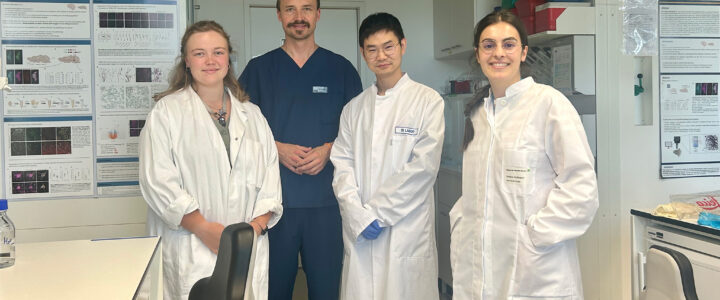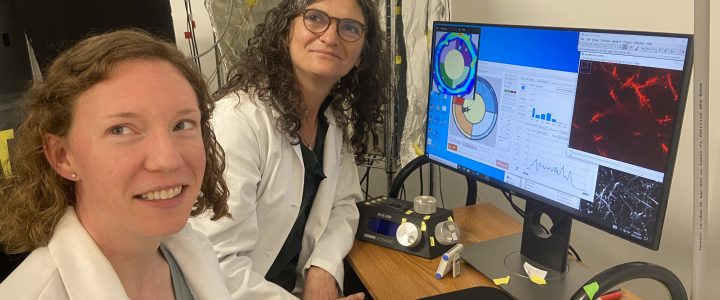Fragile X syndrome researchers model R-loop therapy in patient-derived brain organoids to restore FMR1, accelerating a curative approach supported by FRAXA.
Read moreTreatment Targets
Investigating the Role of the Insulin Degrading Enzyme (IDE) in Fragile X Syndrome

FRAXA Research Foundation awards a $100,000 grant to Ludwig Maximilian University researchers to investigate the role of insulin-degrading enzyme (IDE) in Fragile X syndrome, exploring new therapeutic approaches for cognitive and metabolic challenges in FXS.
Read moreAltered Physiology of Primary Visual Cortex in Fragile X Syndrome

Discover how a $100,000 FRAXA grant supports research at MIT targeting neuron dysfunction in Fragile X, aiming to develop new therapies to improve sensory processing and behavior.
Read moreTo Interrogate the Developmental Timing for Treating Fragile X Syndrome

Are there critical periods in Fragile X syndrome? Will treatment work in adults as well as in children? This team aims to answer these questions.
Read morePharmacologically Activating mGluR7 as a Novel Therapy for Fragile X Syndrome

Join Dr. Tsai and Dr. Kumar on a journey into novel treatment avenues for Fragile X syndrome. Learn how activating mGluR7 could be a game-changer, opening up uncharted therapeutic territory.
Read morePharmacological Modulation of Nicotinic Signaling

Nicotine — familiar to any smoker — tickles nicotinic acetylcholine receptors in the brain. These receptors are key to important brain functions including learning and memory. This team will explore whether drugs that dampen these receptors can improve cognitive function in Fragile X.
Read moreAstrocyte Contribution to Sensory Hypersensitivity in Fragile X Syndrome

Most Fragile X research has focused on one type of brain cells: neurons. But mounting evidence point to problems with astrocytes, star-shaped cells which are vitally important to normal brain function. This team is working to understand how astrocytes are involved in Fragile X and develop treatment approaches that targets astrocytes alone.
Read moreReactivating the FMR1 Gene to Reverse Fragile X Syndrome

FRAXA Research Foundation is dedicated to funding breakthrough research, providing $240,000 to reactivate the FMR1 gene to combat Fragile X Syndrome, with the goal of restoring vital protein function and advancing towards a cure.
Read moreC-subunit Mitochondrial Leak Channel in Fragile X Syndrome

Explore Yale’s groundbreaking study on mitochondrial leak channels, set to revolutionize Fragile X syndrome treatment. Funded by a $100,000 FRAXA grant.
Read moreAntisense Oligonucleotides (ASOs) to restore FMRP in Human Fragile X Cerebral Organoids

Explore Dr. Richter’s encouraging results with ASOs for Fragile X syndrome. A $100,000 grant now fuels pivotal studies needed to advance toward ASO therapy.
Read moreSlack Potassium Channel Inhibitors to Normalize FMR1 Knockout Mice

Learn how a $100,000 FRAXA research grant supports Yale researchers in using Slack potassium channel inhibitors to treat Fragile X syndrome by normalizing behaviors in FMR1 knockout mice.
Read moreRoles of Postnatal Transient Connectivity in the Development of Fragile X Syndrome

A $100,000 FRAXA research grant awarded to Gabrielle Pouchelon, PhD, and Dimitri Dumontier, PhD, at Cold Spring Harbor Laboratory fuels groundbreaking research on Fragile X syndrome. Their work focuses on understanding sensory sensitivities and developing a noninvasive screening method, a potential game-changer for families affected by Fragile X syndrome.
Read moreThe Endocannabinoid System and Fragile X Syndrome

Explore groundbreaking research on the potential of Cannabidiol (CBD) in modulating the endocannabinoid system for Fragile X syndrome therapy. Discover how CBD could change the natural course of Fragile X.
Read moreSRC Family Kinase Inhibitor as a Potential Treatment for Fragile X Syndrome

Discover the Smith lab’s new approach to treating Fragile X syndrome using Saracatinib, originally a cancer drug. Learn how this $100,000 FRAXA research grant-funded study opens up hopeful avenues.
Read moreUsing Exosomes to Discover Fragile X Biomarkers

How can a blood test give an accurate picture of brain activity? With this grant from FRAXA, Dr. Martire and Dr. Boussadia will try to use unique particles called exosomes – which can travel from brain cells to the blood stream – to evaluate the effects treatments are having on the brain.
Read moreTargeting Cognitive Function in Fragile X Syndrome

It has long been assumed that the differences between males and females with Fragile X were simply a matter of degree, with males being more severely affected. But gender differences may be far reaching. This team is working to understand imbalances in how the brain’s neurons transmit signals, with a focus on how differently males and females learn and experience anxiety. They are studying two neuronal pathways which are promising targets for treatment.
Read moreValidating Novel Inhibitors of ERK Signalling to Treat Fragile X Syndrome

One promising treatment approach for Fragile X syndrome is to inhibit on a neuronal pathway, ERK. ERK inhibitors are also being studied as treatments for other disorders including autism.
This team has conducted pilot studies showing that ERK inhibitors are very effective in reversing signs of disease in Fragile X mice. With this grant from FRAXA they will take the next steps toward possible clinical trials of an ERK inhibitor for individuals who have Fragile X syndrome.
Targeting Serotonin 1a Receptors to Reverse Neurobehavioral Phenotypes
Neurolixis’ new drug targets serotonin 1A receptors, showing promise in preclinical studies for Fragile X syndrome, funded by a FRAXA grant for future clinical trials.
Read moreSigma-1 Receptor as a Therapeutic Target for Fragile X Syndrome

Dr. Pouladi’s team is exploring a treatment of Fragile X via the sigma-1 receptor. Drugs that boost activity at sigma receptors tend to calm down overactive neurons. They are also powerful anti-inflammatory drugs.
Read moreTargeting Serotonin 1A Receptors in Fmr1 Knockout Mice

Dr. Canal has discovered a promising treatment approach for Fragile X syndrome: new compounds which specifically and potently boost serotonin in the brain. The target is the brain’s serotonin 1A receptor.
Read moreTranscriptional Signatures Sensitive to Cognition-Improving Pharmacological Treatments in Fragile X Syndrome

The Fragile X field needs biomarkers to accurately measure the effects of potential treatments in both Fragile X mice and in humans. Dr. Ozaita and his team have found molecular features in the brain that can serve as an objective signature for the syndrome. They will use this tool to test cannabidiol and two other drugs in mice.
Read moreCharacterization and Modulation of microRNAs in Fragile X Syndrome

Could microRNAs be a new path to treatment of Fragile X syndrome? MicroRNAs are disrupted in Fragile X, and so this team will work to understand what is going wrong and explore ways to correct it with drugs which directly target microRNAs.
Read moremRNA Therapy for Fragile X Syndrome

Dr. Kathryn Whitehead, Associate Professor at Carnegie Mellon University, helped develop the revolutionary science behind the COVID-19 vaccines. With a $103,000 grant from FRAXA, her team will now adapt this technology to deliver the missing Fragile X protein, to treat people who have Fragile X syndrome.
Read moreCorrecting Fragile X Syndrome Deficits by Targeting Neonatal PKCε Signaling in the Brain

With this $90,000 grant from 2017-2018, Dr. Banerjee’s team has shown that enhancing PKCε can correct brain development and abnormal behaviors in Fragile X knockout mice and had their findings published in PubMed.
Read moreCharacterization of a Novel CYFIP1 – Derived Peptidomimetic Restoring the Dysregulated mRNAs Translation: Toward An Innovative Therapeutic Strategy for FXS

The researchers are developing next-generation drugs called peptidomimetics, using the functional features of FMRP. If they succeed, the hope is that we will have new drugs that could make up for the loss of FMRP, thus treating Fragile X syndrome.
Read more
